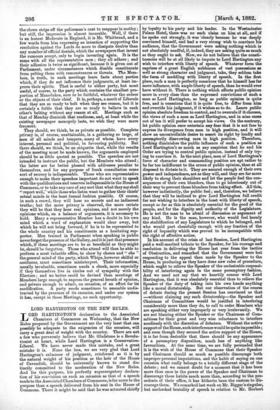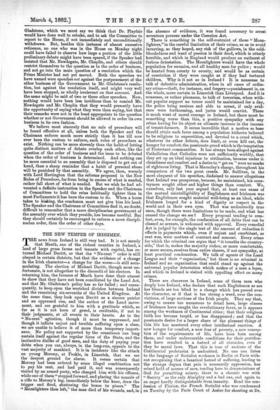LORD HARTINGTON ON THE NEW RULES.
-FIORD HARTINGTON'S declaration to the Associated Chambers of Commerce on Wednesday, that the New Rules proposed by the Government are the very least that can possibly be adequate to the exigencies of the occasion, will carry a great deal of weight with the country. There are not a few who perversely believe that Mr. Gladstone is a Revolu- tionist at heart, while Lord Hartington is a Conservative- Liberal. We have never made this mistake, and a great mistake it is. None the less, we are very glad that Lord Hartington's calmness of judgment, reinforced as it is by the natural weight of his position as the heir of the House of Cavendish, should be universally known to stand dis- tinctly committed to the moderation of the New Rules. And for this purpose, his perfectly supererogatory declara- tion of his conviction on such an occasion as that of a speech made to the Associated Chambers of Commerce, is far more to the purpose than a speech delivered from his seat in the House of Commons. There it might be said that he was actuated chiefly
by loyalty to his party and his leader. In the Westminster Palace Hotel, there was no such claim on him at all, and if he spoke out strongly, it was 'clearly because he was deeply convinced himself, and had a very strong wish to convince his audience, that the Government were asking nothing which is not absolutely needful, if, indeed, they are asking quite as much as they ought to ask. Now, we do not believe that the consti- tuencies will be at all likely to impute to Lord Hartington any wish to interfere with liberty of speech. Whatever form the caprices of a great English nobleman of vast possessions as well as strong character and judgment, take, they seldom take the form of meddling with liberty of speech. In the first place, such a man is perfectly conscious that he himself has far more influence, with ample liberty of speech, than he would ever have without it. There is nothing which affects public opinion more in every class than the expressed convictions of such a man as Lord Hartington, so long as public opinion is quite free, and is conscious that it is quite free, to differ from him and override his judgment, if it wishes so to do. Leave public opinion absolute freedom to control, and to overrule if it chooses, the views of such a man as Lord Hartington, and in nine cases out of ten it will prefer to accept his views. On the contrary, let public opinion once entertain any fear that it is not free to express its divergence from men in high position, and it will show an uncontrollable desire to assert its right by loudly and peremptorily disavowing men in high position. Therefore, nothing diminishes the public influence of such a position as Lord Hartington's so much as any suspicion that he and his Order are trying to control public opinion, instead of only try- ing to convince it. In the next place, men of Lord Hartington's force of character and commanding position are apt rather to be far too indifferent to the errors of public opinion, than at all disposed to dictate to it. They are assured enough of their own power and independence, act as they will, and they are far more likely to shrug their shoulders and let the people feel the con- sequences of their own blunders, than to go laboriously out of their way to prevent those blunders from taking effect. All this, however indistinctly, the public feel ; and, therefore, we believe that they will be inclined to give Lord Hartington full credit for not wishing to interfere in the least with liberty of speech, except so far as this is absolutely essential for the good of the people, and for the dignity and authority of the Legislature. He is not the man to be afraid of discussion or argument of any kind. He is the man, however, who would feel keenly the stultification of any Legislature to which he belonged, and who would part cheerfully enough with any fraction of the right of loquacity which was proved to be incompatible with the right of effective action.
In his account of the crisis of last Session, Lord Hartington paid a well-merited tribute to the Speaker, for his courage and resolution in delivering the House last year from the tactics of Obstruction, and remarked that the Government were but responding to the appeal then made by the Speaker to the House, in producing as they have done new rules of procedure, which ought to relieve the Speaker of the undesirable responsi- bility of interfering again in the same peremptory fashion. And we need not say that we heartily concur with Lord Hartington, that it was absolutely essential thus to relieve the Speaker of the duty of taking into his own hands anything like a moral dictatorship. But our observation of the course of debate during the present Session has convinced us that —without claiming any such dictatorship—the Speaker and Chairman of Committees would be justified in interfering considerably more than they do, to call to order Members who are speaking either very improperly or very irrelevantly. We are not blaming either the Speaker or the Chairman of Com- mittees for their great and very wise reluctance to interfere needlessly with the discretion of debaters. Without the active support of the House, such interference would be quite impossible ; and even though they secured the active support of the House, it is far from desirable that there should be any appearance of a peremptory disposition, much less of anything like favouritism. At the same time, we are fully persuaded that it is the wish of the House of Commons that their Speaker and Chairman should as much as possible discourage both improper personal imputations, and the habit of saying on one occasion what really belongs to a totally different stage of the debate ; and we cannot doubt for a moment that it has been more than once in the power of the Speaker and Chairman to discourage these habits much more than, according to the pre- cedents of their office, it has hitherto been the custom to dis- courage them. We remarked last week on Mr. Biggar's singular, but unchecked brutality of speech in relation to Mr. Herbert Gladstone, which we must say we think that Dr. Playfair would have done well to rebuke, and to ask the Committee to report to the House, if not immediately and unconditionally withdrawn. But, besides this instance of almost excessive reticence, no one who was in the House on Monday night could have failed to observe how large a portion of the little preliminary debate might have been spared, if the Speaker had insisted that Mr. Newdegate, Mr. Chaplin, and others should restrict themselves to the question as to the order of business, and not go into the main question of a resolution which the Prime Minister had not yet moved. Both the speeches we have named were speeches not against the postponement of the other business of the Government to Mr. Gladstone's resolu- tion, but against the resolution itself, and might very well have been stopped, as wholly irrelevant on that account. And the same might be said of two or three other speeches. Now, nothing would have been less invidious than to remind Mr. Newdegate and Mr. Chaplin that they would presently have the opportunity of saying what they were then saying, but that their remarks were not in the least appropriate to the question whether or not Government should be allowed to order its own business in its own fashion.
We believe most sincerely that no rule of procedure will be found effective at all, unless both the Speaker and the Chairman enforce much more strictly than it has till now ever been the custom to enforce, such rules of procedure as exist. Nothing can be more slovenly than the habit of letting quite distinct matters of debate overlap each other, like the question of the order of business and the issue to be debated when the order of business is determined. And nothing can be more essential to an assembly that is disposed to get out of hand, than a sharp reminder that a habit of personal abuse will be punished by that assembly. We agree, then, warmly with Lord Hartington that the reforms proposed in the New Rules of Procedure, far from being in excess of what is needed, rather fall short of what is needed. But we wish he had ad- vocated a definite instruction to the Speaker and the Chairman of Committees to hold the reins habitually tighter than in most Parliaments it has been the custom to do. When a horse takes to kicking, the coachman must not give him his head. The Speaker and the Chairman of Committees find it, no doubt, difficult to remember that a more disciplinarian government of the assembly over which they preside, has become needful. But they should certainly be encouraged to enforce a more discipli- narian order, than the order of other days.



































 Previous page
Previous page